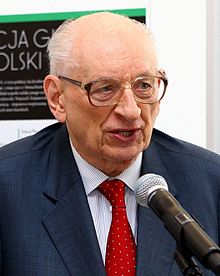Wladyslaw Bartoszewski
| Władysław Bartoszewski | |
|---|---|
 |
|
|
Minister of Foreign Affairs of Poland 3rd and 6th Minister of Foreign Affairs of the Third Republic of Poland |
|
|
In office 30 June 2000 – 19 October 2001 |
|
| President | Aleksander Kwaśniewski |
| Prime Minister | Jerzy Buzek |
| Preceded by | Bronisław Geremek |
| Succeeded by | Włodzimierz Cimoszewicz |
|
In office 7 March 1995 – 22 December 1995 |
|
| President | Lech Wałęsa |
| Prime Minister | Józef Oleksy |
| Preceded by | Andrzej Olechowski |
| Succeeded by | Dariusz Rosati |
| Ambassador of The Republic of Poland to Austria | |
|
In office 20 September 1990 – 1 September 1995 |
|
| Member of Senate | |
|
In office 20 October 1997 – 18 October 2001 |
|
| Personal details | |
| Born |
19 February 1922 Warsaw, Poland |
| Died | 24 April 2015 (aged 93) Warsaw, Poland |
| Cause of death | Myocardial infarction |
| Spouse(s) | Zofia Bartoszewska |
| Children | Władysław Teofil Bartoszewski |
| Occupation | Academician, journalist, politician, resistance member, social activist, writer |
| Religion | Roman Catholic |
Władysław Bartoszewski ([vwaˈdɨswaf bartɔˈʂɛfskʲi]; 19 February 1922 – 24 April 2015) was a Polish politician, social activist, journalist, writer and historian. A former Auschwitz concentration camp prisoner, he was a World War II resistance fighter as part of the Polish underground and participated in the Warsaw Uprising. After the war he was persecuted and imprisoned by the communist Polish People's Republic due to his membership in the Home Army and opposition activity.
After the collapse of the communist regime, Bartoszewski served twice as the Minister of Foreign Affairs from March through December 1999 and again from 2000 to 2001. He was also an ambassador and a member of the Polish Senate. Bartoszewski was a close ally and friend of Polish anti-Communist activist and later president Lech Wałęsa.
Bartoszewski was a chevalier of the Order of the White Eagle, and an honorary citizen of Israel and a member of the International Honorary Council of the European Academy of Diplomacy.
Bartoszewski was born in Warsaw to a Catholic family. He studied at Saint Stanisław Kostka Secondary School. In 1939 he graduated from The Humanist High School of the Roman Catholic Future Educational Society in Warsaw.
In September 1939, Bartoszewski took part in the civil defense of Warsaw as a stretcher-bearer. From May 1940, he worked in the first social clinic of the Polish Red Cross in Warsaw. On 19 September 1940, Bartoszewski was detained in the Warsaw district of Żoliborz during a surprise round-up of members of the public (łapanka), along with some 2,000 innocent civilians (among them, Witold Pilecki). From 22 September 1940, he was an Auschwitz concentration camp prisoner (his inmate number was 4427). Due to actions undertaken by the Polish Red Cross, he was released from Auschwitz on 8 April 1941.
...
Wikipedia
